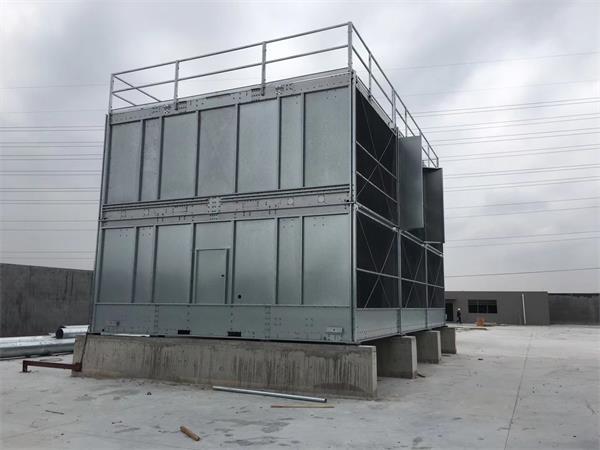
The cooling effect of the cooling tower is reduced
The common reasons for the decrease in cooling tower performance are:
1. The damage and detachment of the water filling material lead to the growth of algae, and the accumulation of garbage or scale on the filling material reduces the heat exchange area and increases the water density, resulting in an increase in the outlet water temperature.
2. The uneven distribution of water is caused by uneven heights of blockage in the water distribution tank, overflow of the tank, blockage and detachment of the nozzle, and incorrect splashing discs. The function of the water distribution system is to evenly splash hot water onto the entire water filling material, extending the contact time and contact area of the steam water heat exchange. Uneven water distribution reduces the cooling effect of the tower.
3. The installation gap of the filling material near the beam and column of the ventilation duct is too large, and there are holes with poor sealing or uneven height in the ventilation duct, resulting in insufficient suction force. In addition, the accumulation of scale, oil, and algae on the packing or water trap, as well as excessive water load flowing into the packing, can also cause a decrease in air flow rate, a weakening of steam water heat exchange intensity, and a decline in the performance of the cooling tower.
4. Abnormal dosing treatment of circulating water discharge results in a high concentration ratio of circulating water, causing precipitates containing calcium bicarbonate, magnesium bicarbonate, and calcium sulfate to condense on the inner surface of the heat exchange equipment, and sometimes deposit on the water spray plate. These dirt blocks the pipes of the heat exchange equipment, reducing the cooling efficiency of the tower.
5. Improper winter operation of cooling towers located in cold and extremely cold regions can cause ice formation at the air inlet and water filling, directly affecting the thermal performance of the tower. The frequent start stop of cooling towers in winter seriously affects the operational efficiency and service life of equipment, and increases maintenance costs.
Water density refers to the amount of cooling water that passes through a unit area of water filled material, and it is also one of the main factors affecting the output of a cooling tower.
Due to improper operation and untimely maintenance, nozzle blockage, packing damage, and algae growth have occurred, resulting in a reduction in heat transfer area and an increase in water spray density. The attached figure shows the change in outlet water temperature with a relative decrease of 1% to 25% in the water spraying area.
Another important parameter that affects the performance of cooling towers is the circulating water flow rate. Increasing the circulating water volume is beneficial for heat exchange on the condenser side, but there is an optimal circulating water volume for the cooling tower.
When the relative humidity of the air exiting the tower has not reached saturation, increasing the circulating water volume can gradually saturate the air exiting the tower. If the circulating water volume continues to increase, the outlet water temperature will quickly rise because the air has reached saturation of heat absorption, and the excess heat released by the hot water cannot be absorbed by the air again. In addition, the excessive consumption of pump power has little effect on the efficiency improvement of the steam turbine. In fact, it compensates for the temperature rise at the outlet of the cooling tower by using the power consumption of the circulating water pump.
Previous topic: The role of enclosed cooling towers
Article Address:https://www.trlen.com/news/740.html
Guangdong Trlon Energy-saving Air Conditioning Equipment Co., Ltd.
Contact:Mr. Wang
Free Hotline:4008-8383-95
Company Email:sales@trlon.com
Web Site:https://www.trlen.com/
Company Address: 1916A, Block A, David Donglong Business Building, Longhua, Longhua District, Shenzhen